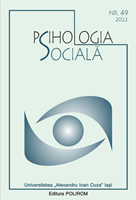Politica de contracarare a tăierilor ilegale de păduri din România. Problema încrederii
The policy to counter the illegal cutting of forests in Romania. The trust issue
Author(s): Marian‑Cristian Bălăcescu, Stefan UngureanSubject(s): Environmental and Energy policy, Politics and society, Social Theory, Environmental interactions, Sociology of Politics
Published by: EDITURA POLIROM S.A.
Keywords: trust; stakeholder analysis; public policies; illegal logging; deforestation;
Summary/Abstract: The study analyzes the aspects of trust within the existing relations between the 34 stakeholders involved in solving the phenomenon of illegal logging, which is treated as a public policy issue. Conceptually, trust is modeled as a multifaceted construct, with 6 distinct types, based on what generates it. The employed instrument (a questionnaire) measures the level of trust/distrust and the incidence of each type, through a series of verbal descriptors (phrases) which reflect the trust behaviors perceived when the subjects experience situations of cooperation/conflict in the interaction with the phenomenon. The methodology involves statistical analysis: frequency, cluster, correlation study and variance analysis for correlated data. The study sample, stratified on the criterion of belonging to a stakeholder, has national representation. The results indicate trust/mistrust levels (cumulative values), cluster grouping and their relation to other known attributes (power, interest). The stakeholders are analyzed and classified according to the types of trust they exercise (calculative vs. relational), reflecting how each trust type facilitates the mechanism of producing the cohesion of the involved organizations and the accumulation of trust capital. The results argue that a consequence of involvement in solving the problem from functional positions (of authority, with assigned roles) is the generation of a sufficient „amount” of trust in groups, where the types of „trust by identification” dominate. In the interpretive register, trust is connected to the role played by the stakeholder in the program (Mertonian paradigm). Practically, this research offers a new perspective upon the involved actors: who are the stakeholders that matter and what is the lever to increase their credibility and strengthen cohesion, who opposes solving the problem and who is interested in maintaining it to trade it at the imagological level.
Journal: Psihologia socială
- Issue Year: 1/2022
- Issue No: 49
- Page Range: 77-98
- Page Count: 22
- Language: Romanian
- Content File-PDF

